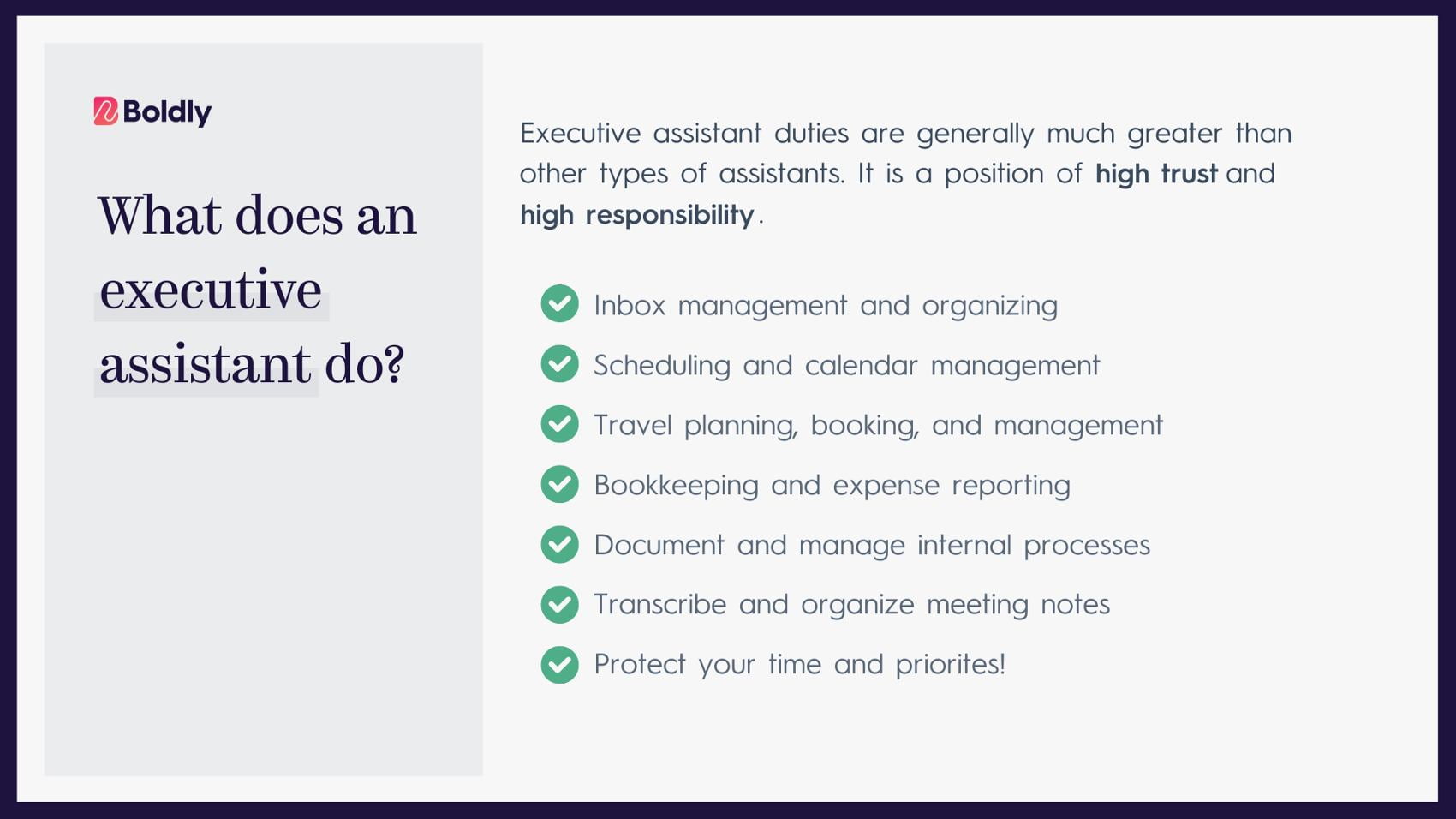What does an administrative assistant do? What does an executive assistant do? Are they the same job? Is a personal assistant something else entirely?
Is there a difference between a virtual assistant and a remote executive assistant?
With so many different types of assistants—some with similar sounding titles—it’s important to know what makes them unique.
Here’s what you need to know about the executive assistant role so you can decide if that’s what you’re looking for and whether to bring them on as part of your team.
Read more: From Admin to Strategist: Top Executive Assistant Statistics


A Summary Of Executive Assistant Responsibilities
Executive assistant responsibilities are notably extensive and typically more strategic when compared to other assistant roles. A short list of executive assistant tasks and expectations could include:
- Managing calendars and appointments for company leadership.
- Handling communications for company leaders, particularly in the management of email. That includes writing and responding to emails, inbox management, and sorting email. It also includes taking phone calls and passing on relevant messages to leaders in a timely and appropriate manner.
- Preparing for meetings and presentations for company leaders, including gathering all materials, handling meeting details, and making sure that everything required to make the meeting run smoothly has been taken care of.
- Planning travel for work and personal needs for company leaders, paying special attention to the preferences of each leader.
- Project or team management at an appropriate level as determined by your company.
- Managing access and archival of documents, processes, records, and proprietary information for company leaders.
- Protect your time and priorities, especially when there is a lot of pressure on your time and energy.
At first glance, this list might not seem different from what you’d expect from a list of admin assistant skills. In fact, many executive assistant responsibilities will overlap with some of the things an admin assistant might do.
But the truth is an executive assistant is not the same as an admin assistant.
An executive assistant is a position of responsibility and high trust. It’s more than having someone on your team who clears a task list. It’s having a real team member dedicated to your success and who has your back.
One way to see the difference is to ask one simple question: What does an executive assistant bring to the company?
Necessary Executive Assistant Skills
That list of responsibilities means that executive assistant skills must include a mix of both professional and personal skills in several key areas:
- Communication: An executive assistant should have the ability to adapt to different communication styles and represent the voice of the company leader they support. They should be able to communicate professionally and clearly in both written and spoken forms.
- Trustworthiness: An executive assistant should have personal ethics that make it possible for their executive to trust them, both in handling sensitive information and in reliability to see work finished.
- Knowledge: Today’s executive assistant must have capabilities working with common software, online apps, AI tools, and other planning and project management tools. Your clients may have proprietary systems they’ll be required to use. Which means…
- Adaptability: An executive assistant must have the ability to learn and adapt to different systems, tools, and work styles, and a willingness to adopt the methods that work best for you and your company.
- Emotional Intelligence: An executive assistant must be able to understand not only their executive’s personality, but also those of team members and clients so that projects and meetings go smoothly. An executive assistant must be a good match with your personality as they are going to be a main source of support.
- Experience: A history of working with executives who have high expectations and significant need for effective and efficient output is critical for an EA. While a less experienced EA still has much to offer, C-Level executive assistants should have no less than seven years experience working at that level.
Hard skills, such as knowing how to use specific software or being familiar with methods of time management, are easier to understand or measure than soft skills that involve personalities and being able to read and anticipate what a person will do.
For the executive assistant, however, both are necessary.
The Executive Assistant Job Role
So what does an executive assistant do, in light of those required skills and responsibilities?
The short answer is that it varies. An executive assistant’s most basic role is to support you in a way that makes your role more effective, efficient, and successful. What that looks like depends on your individual needs and company culture.
Not every executive needs an assistant full-time. Some EAs are dedicated to one executive, while others serve in a fractional capacity in which the fractional executive assistant is shared between leaders. A part-time EA may be a good fit if your company has more than one executive who needs support.
The executive assistant job role will also vary depending on the type of worker the assistant is.
Will the assistant be an employee of the company they work for, or be a freelancer or an independent contractor? Will the assistant work for a staffing agency, or as part of a pool assigned to different executives as the need arises?
The role and expectation of a dedicated executive assistant, whether hired as an employee or as a freelancer, will be very different from an agency or pool. The former allows them to be a part of the team, while the later veers more towards task completion.
An Executive Assistant Career Trajectory
The option of having a remote executive assistant opens the doors to endless opportunities for both executives and the EAs who support them.
No longer limited to geographic limitations, remote EAs partnering with executives are able to access top talent and high-performing people in exciting industries and backgrounds. Work-life balance is improved for executives who are able to claim their time back, while remote assistants have more control over their hours.
But to make it work, career growth and professional opportunities—part of a necessary culture of learning—must be in place.
Executives who want to maintain high-performing assistants need to provide growth opportunities for their EA.
Most importantly, there must be a good match between personality and company values. This reduces conflict and increases the likelihood of an executive and their assistant having a successful working partnership for years to come.
How Is An EA Different From Other Types Of Assistants?
Understanding the nuances between various assistant roles can help you decide what type of support you need.
It’s important to note that while these roles have distinct primary functions, there can often be overlap depending on an organization’s structure and needs.
- Administrative Assistant (AA) – Often handles routine office tasks, such as data entry, phone reception, and file management. They ensure the smooth operation of office logistics. The role is often entry-level.
- Personal Assistant (PA) – Focuses on individual tasks related to personal affairs, appointments, travel, and sometimes household management. Read more about the role of a personal assistant (PA) here.
- Virtual Assistant (VA) – Provides remote assistance across various tasks, including administrative, technical, or creative assistance, depending on the client’s requirements. Typically responsibilities more task-focused and less strategic than an executive assistant. Learn more about the difference between a virtual assistant and a remote executive assistant.
- Executive Assistant (EA) – Works closely with company leadership to manage schedules, communications, and strategic projects. They often act as a liaison and play a role in decision-making processes.
How To Hire An Executive Assistant
If you’re ready to bring on a new EA, there are a number of ways you can hire a rockstar executive assistant. But most of these will require the typical hiring legwork, from writing job descriptions to conducting interviews.
Get started with a premium executive assistant right away — without the headaches of hiring. Learn more about how Boldly works.




